author of Honorable Influence - founder of Mindful Marketing
Today, the mascots of insurance companies are better known than those of many colleges. To test that claim, try the following two-part quiz. The answers appear a few paragraphs below:
1) What are the mascots of the five largest U.S. public university campuses by enrollment?
- Texas A & M University
- University of Central Florida
- Ohio State University
- University of Florida
- Florida International University
2) What are brand characters of the following insurance companies?
- Aflac
- Allstate
- Geico
- Liberty Mutual
- Progressive
If you’re like me, you know more on the second list than the first. Granted, I pay more attention to commercials than most people do, but I’m also a significant fan of college sports who works in higher education, which are good reasons why I should know list #2 too.
So, here are the answers:
1) Aggies, Knights, Buckeyes, Gators, Panthers
2) Duck, Mayhem, Gecko, Emu, Flo
The point of this exercise is to underscore how effective many insurance companies have been at familiarizing us with their brands’ personalities.
Despite the old adage, “You can’t argue with success,” one insurance provider is doing just that, making a very public case that all the time and energy its competitors spend building brand characters is wasted.
Unlike Geico or Allstate, the company with the hot take is not a household name for most people. It’s New Jersey Manufacturers Casualty Insurance Company, or NJM.
NJM began in 1913 by providing worker’s compensation to New Jersey businesses and a couple of decades later started to offer commercial and personal auto insurance and homeowners insurance. Over the last 100+ years it’s expanded its offerings even more, while extending into other states.
Only recently, though, did the company decide to redefine the acronym that’s represented its name for more than a century. Now, at least for the purpose of some contrarian marketing communication, NJM purportedly stands for “No Jingles or Mascots, Just Great Insurance.”
Why would NJM want to throw shade on several of America’s most successful insurance providers? The easy answer is it wants to be big like them but believes that its path to greatness must come not by copying their recipe for success but by being different.
NJM is a sizeable insurer; however, it’s scope and scale are small compared to the mascot-using competitors mentioned above. NJM only markets its products in New Jersey and five nearby states. Similarly, while NJM has about $8 billion in assets, the other firms boast much bigger asset totals:
- Aflac: $165 billion
- Allstate: $126 billion
- Geico: $71 billion
- Liberty Mutual: $145 billion
- Progressive: $64 billion
Positioning against the brand, as it’s called, is not necessarily a bad idea. Avis succeeded with the strategy in the early 1960s, using the tagline “We try harder,” –a clear slight against the number one car rental company at the time, Hertz. Similarly, in 1967 Seven-Up tapped into countercultural sentiment by branding itself as the “Uncola” versus the soft drink “Establishment” that was Coke and Pepsi.
However, there are two important factors that dilute NJM’s claim to be different by not using ducks or geckos.
First, there are plenty of other insurance companies that can make the same claim that they’re more serious about insurance because they don’t use mascots. In fact, they represent the nation’s five largest insurers:
- Prudential
- Berkshire Hathaway
- MetLife
- TIAA
- AIG
To be clear, Berkshire Hathaway does own Geico; however, it also owns these mascot-less insurance firms: National Indemnity Company, General Reinsurance, and Berkshire Hathaway Life Insurance Company of Nebraska.
Also, in case you’re thinking that Snoopy is MetLife’s mascot, the dog is gone. The company dropped the beloved beagle more than five years ago in an effort to reflect “a clean, modern aesthetic.”
Second, in its television commercials trumpeting its decision to not use mascots, NJM uses, of all things, mascots!
To be clear, the mascots in NJM’s commercials are not its own but ones it’s fabricated for fictitious competitors. The commercial characters include an alpaca, a jingle-singing entertainer, an elephant-giraffe-eagle-horse-octopus, a big blue bear, a narwhal, and a ferret.
Again, none of the mascots belong to NJM, but by using them in its humor-infused ads, the company is not so subtly doing the same thing it accuses its competitors of doing—prioritizing playfulness over serious insurance.
It’s kind of like one person scolding another for their profanity by swearing at them, “You s#@% h#@%, you’ve got to stop the b*#&#% cursing!” The point, of course is if the words are bad, no one should be using them.
So, if mascots don’t make for serious insurance, why is NJM using them in its ads?
That question is kind of a rhetorical one, but I can’t resist trying to answer it. It could be that NJM suffers from some mascot-envy and may even be using its commercials as a way of auditioning characters to see if any stick.
More generally, NJM must recognize that using mascots in marketing works. This piece began by identifying several insurance competitors’ well-known characters. Over the years, organizations in other industries also have reaped similar branding benefits from their own creations, such as:
- Energizer – Energizer Bunny
- Keebler Company – Keebler Elves
- Kellogg’s Frosted Flakes – Tony the Tiger
- McDonald’s – Ronald McDonald
- Michelin – Michelin Man
- Pillsbury – Dough Boy
- Planters – Mr. Peanut
- Procter & Gamble’s Mr. Clean – Mr. Clean
- StarKist Tuna - Charlie
Of course, characters aren’t good fits for every industry. We don’t see luxury brands like Cartier, Gucci, or Mercedes employing mascots because they want to be seen as elegant and refined—images that characters can undermine. Likewise, some organizations’ missions are simply too serious to be connected with anything that might come across as irreverent, e.g., the American Lung Association.
But for many companies, mascots serve helpful purposes like giving brands more personal connection and communicating whimsy. But even more basic, the characters often capture our attention, keep our interest, and help us remember what can be easily forgotten products . . . like insurance.
Given the quest for Mindful Marketing, the other important question to ask is whether mascot use is ethical. Two areas that demand special attention are how certain mascots portray people groups and how some characters are used in marketing to children. Otherwise, it’s hard to identify any broad prohibition of mascots for branding.
NJM’s claim that ‘We’re more serious about insurance because we don’t use mascots,’ doesn’t make much sense since its own ads have mascots. Some might call that use disingenuous or deceitful, but it’s unlikely there’s any ill intent.
No, NJM is just searching for a strategy that can lift it to the level of Aflac and Progressive, but such a leap won’t happen by using an eclectic cast of ‘other insurers’ mascots’ and talking more about what the company isn’t than what it is. This specific claim for positioning against the brand should be assessed as “Simple-Minded Marketing.”
Learn more about the Mindful Matrix.
Check out Mindful Marketing Ads and Vote your Mind!

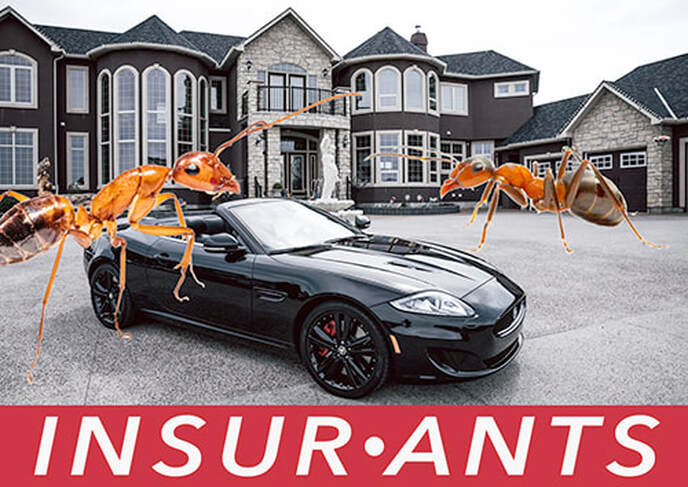
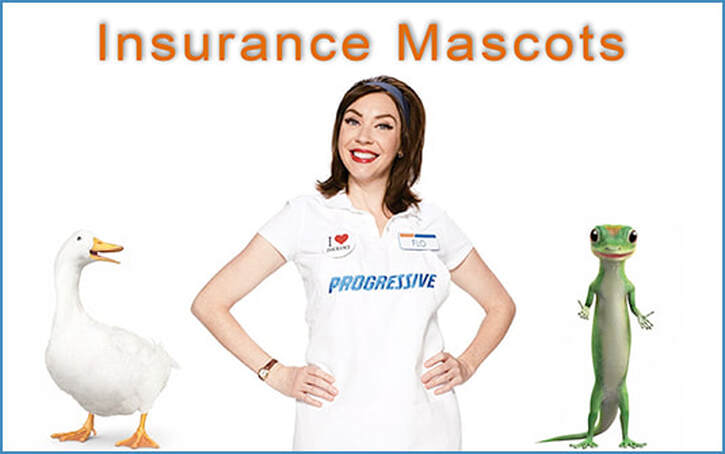
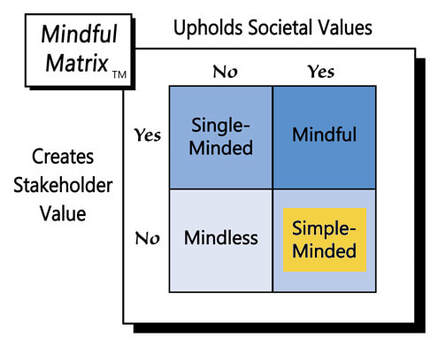

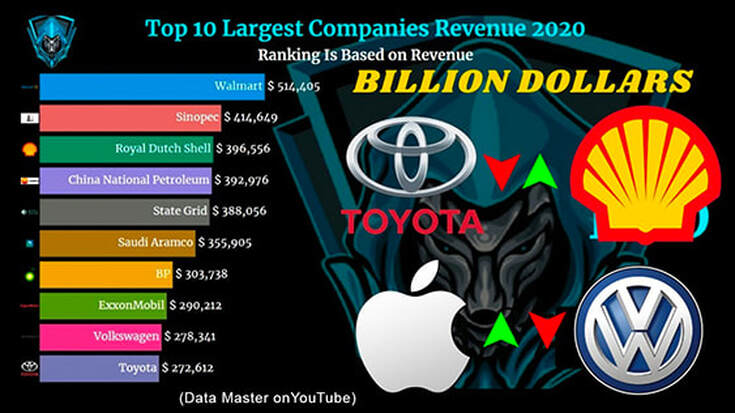
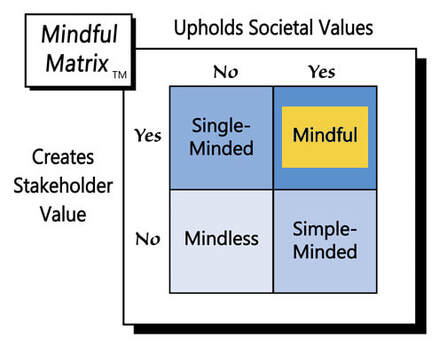
 RSS Feed
RSS Feed